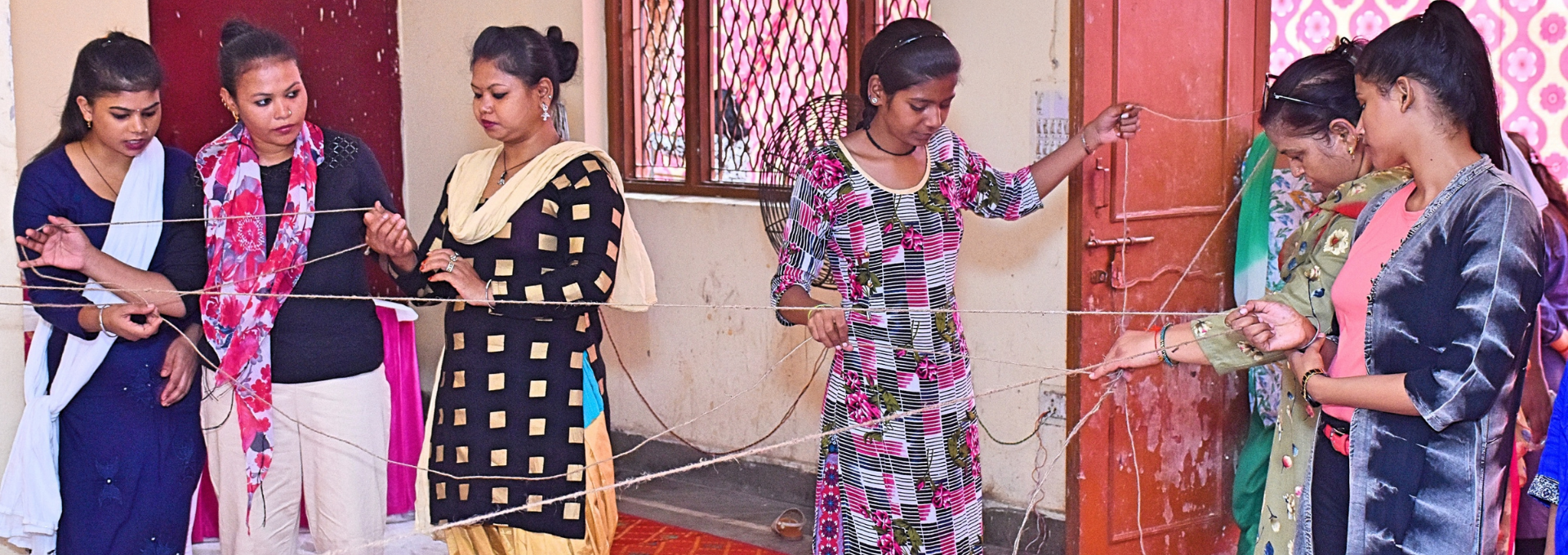
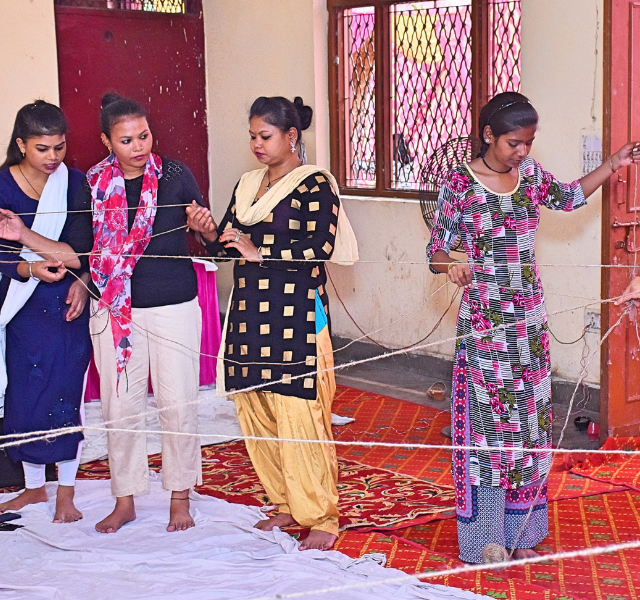
Background
FSWs are at a higher risk of experiencing a broad range of social, sexual and reproductive health conditions such as sexually transmitted infections (STIs)/HIV, unintended pregnancy, violence, sexual exploitation, stigma and discrimination1. Unprotected sex between FSWs and their clients contributes to ongoing HIV transmission globally, and in India2,3. The Targeted Intervention (TI) programs by India’s National AIDS Control Organization (NACO) under the National AIDS Control Program (NACP) involve working with vulnerable communities to provide them with the information, means and skills that they need to minimize HIV transmission and improving their access to care, support and treatment services.
With the advent of mobile and newer communication technologies, the patterns of sex work have also changed and evolved. Mobile phones act as a tool for networking and soliciting. Increasingly, FSWs have started depending on mediators termed ‘Network Operators’ for client solicitation. “Network Operator” is a person who arranges clients for the FSWs and controls the network and takes a percentage/share of the earning of the FSWs in return. The role of NWOs have emerged as a new mechanism in carrying out sex work solicitation in India, as well as across the world.
The scenario in Delhi and the emerging need
The HIV prevalence among FSWs in Delhi (1.6%) is slightly higher than the national average (1.56%)1. The TI program in Delhi began in 2001 with a target of covering 2000 FSWs in the state. Massive scale-up to saturate the coverage of FSWs has occurred and currently (March 2020) the program is reaching out to 51248 FSWs. The expected outcome of the program has been to saturate the coverage of FSW population for provision of HIV prevention, treatment and care services and to achieve sustained behaviour change.
While traditional TI programmes have addressed many issues faced by FSWs in the context of prevention and control of HIV, they have traditionally covered only the FSWs available at the physical hotspots. In recent times,
FSWs have shifted towards network-based (online, network operators, mobile phones) client solicitation and many remain unreached as they are not congregating at a physical hotspot. Street and home-based FSWs have shifted to mobile phone based solicitation methods. Solicitation at physical locations has reduced and working through network operators and mobile phones had increased4. Further to this, the analysis of TI program data had highlighted the gap in service uptake and the stagnation in the levels of coverage and HIV related service utilization. The program data indicated that 75% of FSWs in 2016-17 were not available at physical hotspots and were operating through other sex work networks. Almost four-fifths (77.6%) of the FSW respondents indicated that they used mobile phones for soliciting clients5.
On the basis of the study findings, strategies were developed to reach FSWs engaged in network-based solicitation. The NWO approach was adopted as a part of the ongoing TI program so as to reach out to this hidden population and to link them to prevention counseling, regular STI screening and treatment adherence.
The Network Operator Approach
Network Operator is a person who arranges clients for the FSWs and controls the network and takes a percentage/share of the earning of the FSWs in return. NWOs play a significant role in the process of solicitation for sexual services between FSWs and clients and for information exchange within their networks. They are active on virtual platforms (Messenger Groups, websites, mobile phones) and act as mediators between the FSWs and the clients. It was observed that their role extends beyond just facilitation in sex work to also a responsibility for safety of FSWs associated with them. Acknowledging the potential role that the NWOs can play in engaging with the FSWs to seek HIV services, the NWO approach was incorporated into the TI program strategy.
Geography
This approach has been implemented by 25 TIs covering all the eleven districts of Delhi NCT, namely, North Delhi, North East Delhi, North West Delhi, South Delhi, South East Delhi, West Delhi, Central Delhi, New Delhi, South West Delhi, Shahadra and East Delhi.
Objectives
The NWO approach is designed to motivate the NWOs to proactively encourage the FSW community to seek/access HIV prevention, treatment and care services and shift from high risk behaviour to health-seeking behavior. The objective is to reach out to the hidden/hard to reach FSWs, encourage them to adopt safe sexual practices by providing an enabling environment wherein they can avail HIV services and lead a dignified life, free from stigma and discrimination.
The Network Operator Approach involves mapping the existing networks and NWOs and identifying and profiling FSWs associated with NWOs. This is followed by sensitizing the NWOs to the TI program and the need for service uptake for FSWs. Through snowballing, information about different sex work networks and sex workers working under these networks, is collected to reach out to the women. Further, FSWs that are contacted through this approach, are linked to the TI services. The implementation of the approach is reported and monitored using customized tools and job aids. The sequential steps of the NWO Approach include (Figure 1):

The network mapping and profiling exercises have provided significant insights into the operational aspects of NWOs and the scope of reaching out to the FSWs associated with them. Table 1 reflects the district and TI-wise NWOs and FSWs in Delhi.
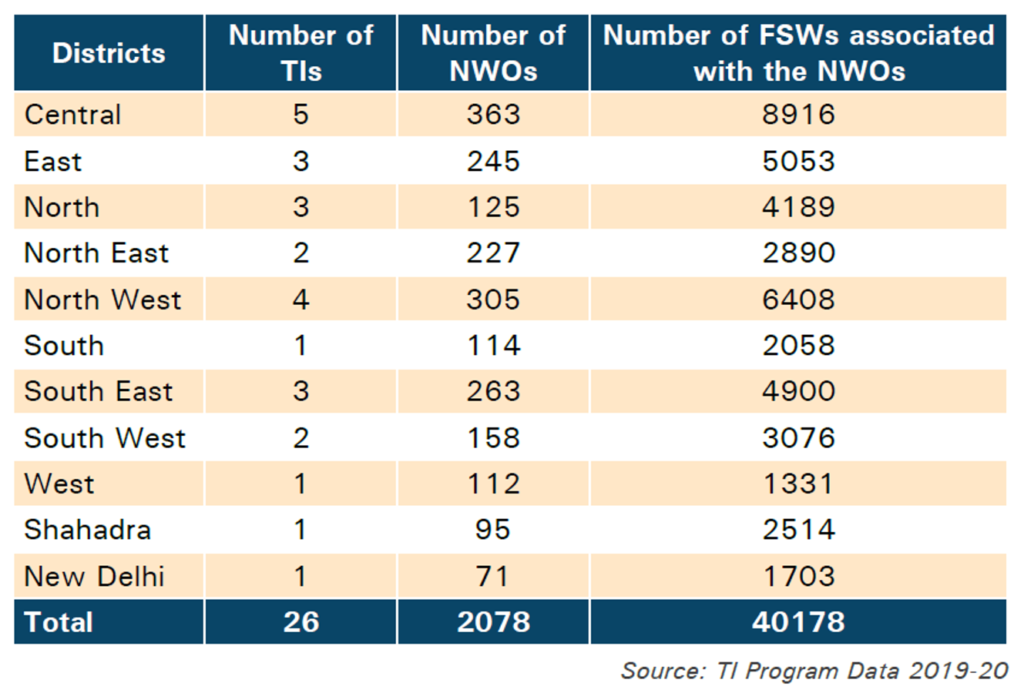
Profiling of 2078 NWOs based in Delhi was conducted. The data indicated that majority of them work only as NWOs. Gender wise data shows that majority (93%) of NWOs were females and only 6 % were males (Figure 2). A large number of NWOs operate in Delhi; but most of them belong to Uttar Pradesh and Bihar (Figure 3).
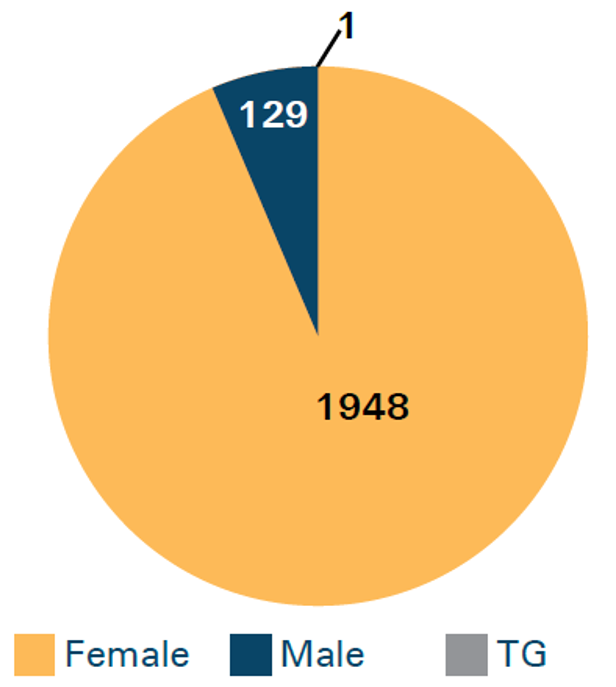
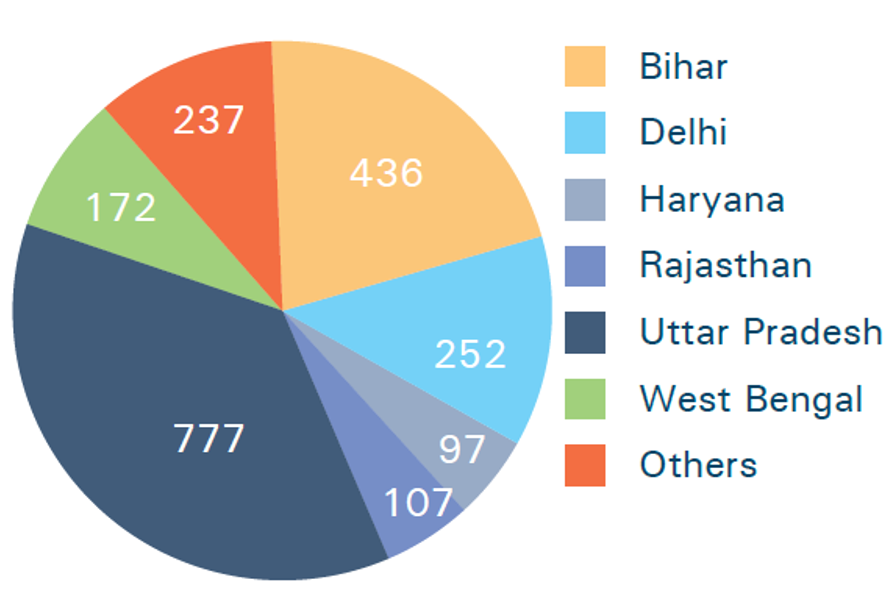
NWOs are also involved in alternative occupations. It was found that alongwith carrying out the network operations, the NWOs were home makers, shop owners, beauty parlor owners, among others (Figure 4).
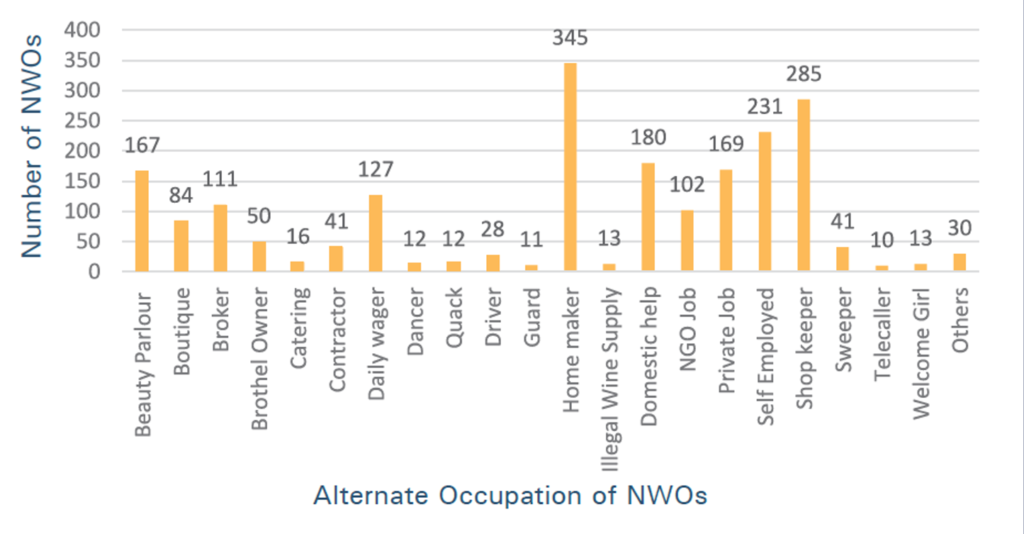
There is a gradual increase in the registrations of NWOs under the TI program. The NWO approach has given a boost to new registrations of FSWs in the TI Program as well (Figure 5). Currently 40178 FSWs are associated with 2078 NWOs. However, the monthly increase up until December 2019 indicates that saturation had not yet been achieved even a year and a half after initiation.
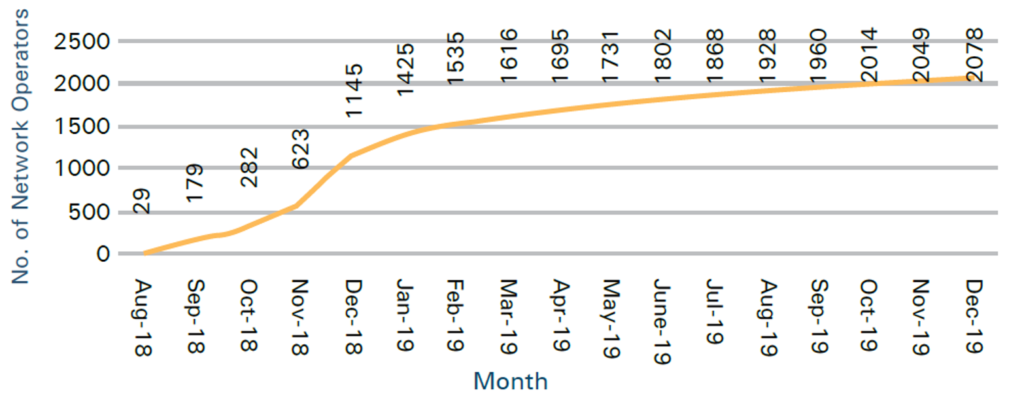
The program data indicates that in Financial Year (FY) 2017-18, 93% of individual FSWs were screened/tested for HIV; which gradually increased to 96% in the FY 2019-20. Linkages of FSWs to ART have seen an increase from 94% in the FY 2017-18 to 98% in FY 2019-20. There has been an improvement in percentage of PLHIV on ART from 73% in FY 2017-18 to 90% in FY 2019-20 (Figure 6). The new registrations gradually increased in the FY 2018-19 and FY 2019-20. Early identification and coverage of young FSWs has also increased along with the increase in the new registrations after the initiation of the NWO approach (Figure 7).
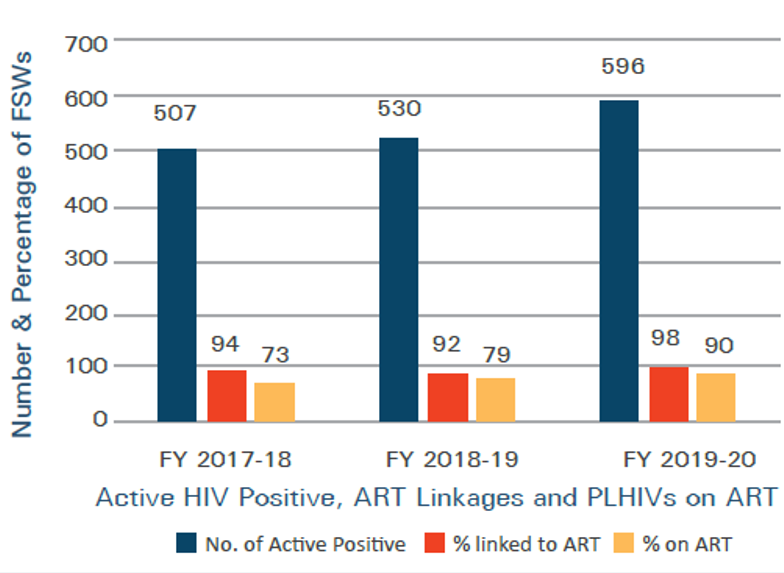
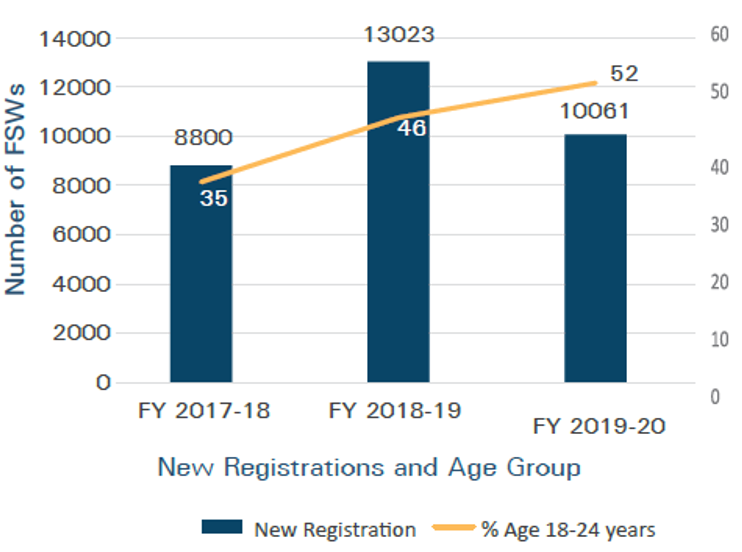
Learnings
One of the major success factors behind the vigorous implementation of the NWO approach has been the cultivation of strong rapport with the NWOs. This was achieved through regular visits that facilitated discussions, active listening and responding to the needs of the community. The values of trust and confidentiality gave a boost to the process of reaching out to unreached FSWs for HIV prevention and treatment services.
Further, the highly-engaging and interactive sensitization meetings with the NWOs, culminating with their felicitation towards their contribution to the program, reaped an affirmative response from them, thus increasing their ownership towards their newly found role.
Continuous engagement with the NWOs is a must as there are various players in the network with frequently changing dynamics in sex work. The implementing agency needs to be responsive to these changes in order to be resilient and adapt as per the need of the stakeholders. For instance, the option to receive services at the doorstep was initiated after it was realized that the FSWs considered this option to be more convenient. These services included screening for HIV and other symptoms of STI, counseling and the provision of commodities for prevention at a location and a time suitable to them.
Challenges
In many of the circumstances, FSWs and NWOs remain in touch with each other through mobile communication only with limited face to face interaction. This poses a challenge to not only reach out to these FSWs with HIV prevention, care and treatment services, but also to monitor their use.
Secondly, due to high mobility of FSWs, the TI programs are not able to reach out to those FSWs that have relocated or have been carrying out solicitation and sex work in the area outside the program’s geographical coverage. We were not able to gather information that would enable us to estimate the average duration of FSW’s stay in Delhi, or the frequency with which they return to their place of origin during a given year.
Another challenge is to reach saturation in covering the target population under the program. This is because this is a very dynamic network with new women continuously entering into sex work and new network operators emerging within the society and the expanding geography.
The Way Forward
As a part of the TI programs, the NWOs are being contacted and sensitized on need for the FSWs to have access to condoms and other HIV prevention, testing and care services. The program in the near future seeks to mobilize NWOs to learn basic service delivery, namely, conducting HIV screening using Community Based Screening kits, educating women on safer sexual practices and encouraging them to seek services like regular medical check-ups, HIV and syphilis testing and opt for safe sexual practices and treatment for those FSWs living with HIV. The program also intends to train them in HIV awareness generation activities to be carried out with FSWs associated with them, using digital and social media based applications.
1Female sex workers experiences of using contraceptive methods: a qualitative study in Kenya
3HIV Sentinel Surveillance Technical Brief 2016-2017, NACO
4Changing Female Sex Work Patterns in Delhi: Geographical to Virtual Network, 2014-15, DSACS, IHAT
5Use of Mobile Phone and Social Media in Sex Work Client Solicitation amongst Clients of HIV Targeted Intervention Projects in Delhi-An Exploratory Study, DSACS & DL TSU, 2018